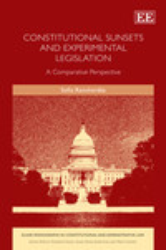Jan. 21, 2015
Thesaurus : Doctrine

Complete reference : Ranchordàs, S., Constitutional Sunsets and Experimental Legislation. A comparative Perspective, coll. "Elgar Monographs in Constitutional and Administrative Law Series", U.K., Edward Elgar, 2015.
Jan. 21, 2015
Breaking news

Just released the book of Sofia Ranchordiàs, Constitutional Sunsets and Experimental Legislation. This topic is particularly important in regulatory systems where this method is used very often.
As soon as Legislation is case management, it becomes a matter of time, good timing, and efficiency.
Because the figure of the Law has changed its terms should change. The most appropriate law then appears the "experimental law", the "trial law." This ephemeral legislation as regulatory bodies promote, can claim to be part of the future only if it has "successful". Operators must be good students if they want to conserve the Law!footnote-14.
Thus, the law is only a draft and it is its success that allows the standard access to the status that was natural: the Act that applies to the future.
These precarious laws that certains authors and regulatory bodies present as the right model, challenge the constitutional principles, the Constitution itself being the supreme law governing the future.
This book shows the extent to which notions of efficiency, testing, flexibility, can attack the very idea of Parliament Law and Constitution. It is true that in regulatory systems everything becomes simple regulations, including laws but it is also true that constitutional courts are restive to admit "experimental laws".
Cet ouvrage montre jusqu'à quel point les notions d'efficacité, de test, de flexibilité, peuvent attaquer l'idée même de Loi et de Constitution. Il est vrai qu'en Régulation, tout ne deviendrait que réglementation, y compris la loi et il est vrai que les cours constitutionnelles sont rétives à admettre les "lois expérimentales".

Jan. 9, 2015
Breaking news

The United Kingdom is probably country of "self-regulation", many academics devote studies, regulators praise its merits, the legislation puts it in place. This is in the area of the press. The electronic media are regulated by OFCOM, but the written press is still self-regulated. British tradition remains so.
La presse britannique, dont on connait la variété du niveau, du Daily Mirror à The Economist et à propos de laquelle les scandales sont nombreux à propos des violations de vie privée et des méthodes pour acquérir les informations, est "autorégulée".
C'est pourquoi un rapport a été publié en 2012, le rapport Leveson, lui-même continuant à recommander l'autorégulation. Sur cette recommandation, a été élaborée le Press Recognition Panel (PRP), entré dans le système juridique par une "Charte royale" le 30 octobre 2013, articulé avec un organe de supervision, le Independent Monitor for the Press (IMPRESS), créé quelques mois plus tard. On ne sait si cela avait bien fonctionné, mais le 8 septembre 2014 le premier organisme est absorbé par le second.
